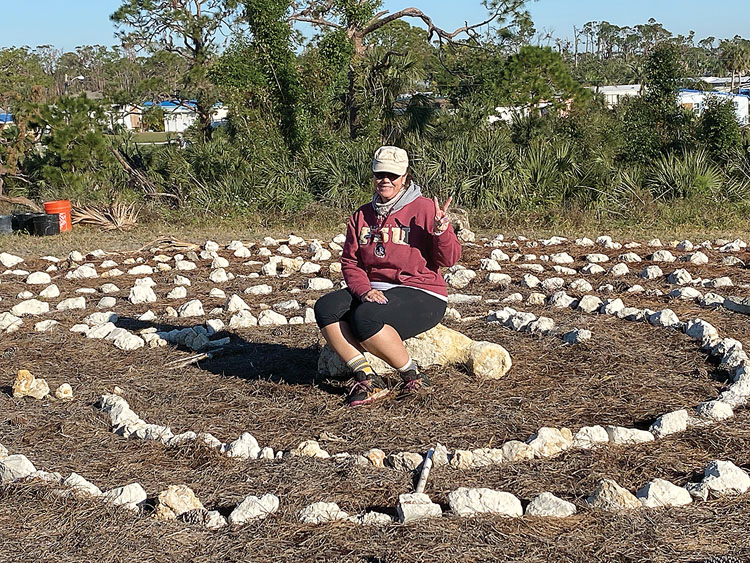How to be a Conservationist
April 19, 2024 at 10:46 a.m.

During a recent guided walk that I led at Lemon Creek Wildflower Preserve, a participant asked me, “What exactly does it mean to be a conservationist? How can I make a difference for conservation?” Through the course of my work over the past several years, I have been asked this question many times, in fact.
My personal definition is this: A conservationist is anyone who dedicates a substantial portion of their time and/or resources to conserving biodiversity, a single species, or particular habitats in any location globally. The definition truly is that broad and it is vital that you DO NOT have to be a scientist in order to be a conservationist. Any citizen of the world can intentionally make real, genuine contributions to conservation.
The real question is, “What should YOU do as an aspiring conservationist?”
Figure out where your talents and your passions lie.
People make the biggest contributions when they do what they actually do best, not what they think conservation needs. If you want to be a conservationist and make a big difference, then first perform an honest self-assessment and take a good hard look at your skills. Perhaps your skills are social media, writing, photography, teaching, fundraising, creating apps, or media technology; use those skills to help make a difference.
Get very good at doing something and do it. Conservation encompasses all sectors of society and the most effective methods of conservation integrate with the whole society. You can be an artist, a manager, an investor, an engineer, a teacher, or a gardener.
Find a place or a single project that you can dedicate serious time, energy, and personal resources to.
Make a long term commitment. Commit your personal time and energy to a single place, project, or effort. Invest a substantial amount of time and be realistic in your expectations; can you make a difference somewhere in only a couple of years? It will be highly beneficial to adjust your thinking toward the long term.
Consider how long it takes a tree to grow. Take your time to discover what tugs at your heart in a way that nothing else does. Find a problem and do whatever it takes to cultivate the skills to solve it. If you can make a difference in just one thing, you have lent yourself over to becoming the agent of change. Search for whatever is close at hand, build serious resources around it, and offer your abilities to it.
Great partners can help you advance your cause in a number of different ways; find collaborators.
Engaging local communities as partners in conservation is crucial. When you believe in what you are doing, don’t be afraid to ask people to support you. When you find good partnerships, you can act fast, access more resources, and scale up the impact, productivity, creativity and quality of every project. Partner with scientists, activists, organizations, communities, and your fellow creatives. Ask for money, time, talent, and commitment.
Do not merely think out of the box; get yourself out of the box entirely.
To make an impactful difference in conservation, devote your skills and time to helping individuals become masters of their own lives; especially in local communities and environments. Join and support programs that equip people with education, opportunities, and provide access to practical tools that empower them. Creating a culture of conservation is an intentional effort, not a fringe activity. In order for this to happen, we must move out of the field of science and align our lifestyle with the natural world.
No matter who you are, you can make a contribution to conservation.
Each and every one of us is able to contribute by educating, inspiring and encouraging those around us to do their part. We can best contribute to conservation by being vocal, passionate advocates of nature. Regardless of your career path, circumstances, or skill set, you can best contribute to conservation by simply choosing to be a conservationist. Speak out about the changes you want to see in the world and support what you say with your actions.
It is imperative to act daily in concrete terms and in ways that directly affect all areas of conservation. Decide to be part of the solution and become active. When you volunteer your time to help further the conservation mission of organizations you believe in, you become an ambassador and influencer for conservation among your own network of friends and family. Model active citizenship of the world through shared responsibility for humanity’s actions.
Do not be afraid to change course on your path.
Bridget Butler coined the concept of “slow birding” with a fresh, slowed-down approach to traditional birding that welcomes deeper observation, listening, and connection to the birds and their environment. Each one of us is forging our own unique path that only we can live to tell. By asking ourselves deep, reflective questions and challenging the assumptions of “normal” standards, we aptly position ourselves for an ongoing meaningful audit of our lives and practice authentic conservation. Embracing nonlinearity makes the conservation journey more fulfilling. Don’t be afraid to make mistakes, learn from them, change course, and keep going.
Lemon Bay Conservancy’s long range vision is to forever protect and preserve the natural features of Lemon Bay, Charlotte Harbor, their surrounding waters and uplands, and vital fish wildlife habitat through property preservation, environmental education and advocacy for sustainable land and water conservation policies and practices. If you would like to learn more, visit lemonbayconservancy.org or email [email protected].